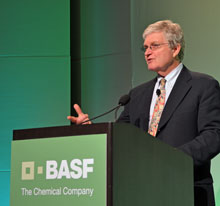 Farmers of the world are producing enough food to meet the demands of wiping out all hunger in the world. But hunger still exists. Why? Dr. Chris Mallett, Corporate VP of Research and Development for Cargill explains it’s a case of economic, not caloric, famine.
Farmers of the world are producing enough food to meet the demands of wiping out all hunger in the world. But hunger still exists. Why? Dr. Chris Mallett, Corporate VP of Research and Development for Cargill explains it’s a case of economic, not caloric, famine.
“[It’s] not the lack of ability to feed people, but it’s the lack of willingness and commitment to doing so,” said Dr. Mallet at last week’s BASF Ag Media Summit in Chicago. Mallet told those in attendance that when looking at food production globally, it can be easy to forget about the realities of the socio-economic conditions on the ground in places such as Africa, where small land holders have actually been hurt by more developed countries’ abilities to produce food at cheaper prices and ship it to those small land holders’ markets. While this has put more food into the overall system, it has taken away those local producers’ markets and made them less able even to buy food… while simultaneously eliminating their desire and ability to raise their own food for that region.
Mallet cited some examples of how his company, in partnership with BASF, is working on providing the key elements to make sure small farmers all over the world can remain viable. “In Vietnam, we’ve trained farmers in how to grow sustainable cocoa. And we will train more than 25,000 farmers in the Ivory Coast in a similar way to gain certification [in sustainable agriculture].” He said Cargill has also trained an additional more than two million farmers in the past year.
You can hear more of what Mallet had to say here:
Dr. Chris Mallett, Corporate VP of Research and Development for Cargill
